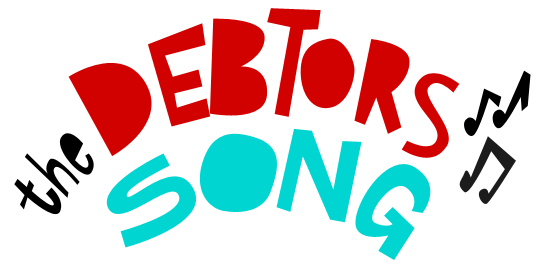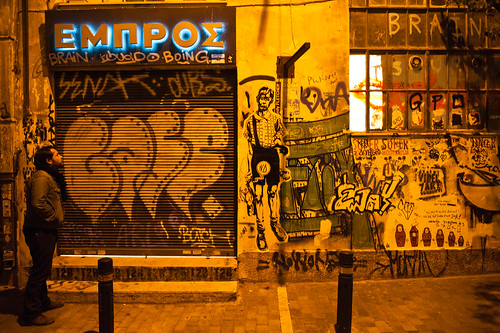Interflugs[1] is a student managed lecture series organized at WestGermany[2], an underground event venue located in a former doctor’s office near Kottbusser Tor.
The Interflugs series is initiated by students of Universität der Künste. The event was well attended, and discussion flowed freely as the crowd had many questions as well as views and interpretations of their own. The topic was “The Price and Value of Free Culture.” Obviously, a question that’s deeply relevant to artists looking to develop their practice in the age of digital reproduction and social media.
Constanze Kurz and Frank Rieger of the Chaos Computer Club presented the “Kulturwerkmark.”[3]
The Kulterwertmark concept is a developing model of democratic cultural production where fans of artists commit to a monthly flat rate to participate, and distribute this amount to individual culture producers by way of micropayments. Simular in principle to the way flattr.com[4] operates.
However, the Kulturwertmark envision this model a much broader social level, where the management of the system is not a private firm, but a foundation made up of the artists and the fans. And more ambitiously, the Kulturwertmark project hopes to get the approval of the major rights holders, such as the record labels and movie studios, to participate, indemnifying the subscribers for persecution for downloading and sharing cultural works, in exchange for money funded by the flat rate paid by the subscribers. The Project also hopes to get approval from other organizations that represent rights holders, such as regional collection societies like Germans notorious GEMA[5].
Even more ambitiously, the project hopes to convince rightsholders and cultural producers to vastly reduce exclusivity periods provided by copyrights, to limit them to 15 years, instead of the current life-plus-x, and even provide an earnings expectation, which would waive copyrights on the work even earlier once a certain level of earnings have been exceeded. Also noting that even once a given exclusivity has expired for a given work, the producers of the work would continue to receive income, since income is directed by fans micro payments, not royalties.
On one hand, there is a lot to support about the system, the collective funds provided by the subscribers flat rate create a kind of mutual capital, that can not only be used to support cultural production, but also cultural preservation and promotion.
The system is inherently democratic, as members of the foundation, fans an artists control the system, and the remuneration of individual culture producers is subscriber-directed, by virtue of the micropayment system.
The use of the micropayment system is an important distinction over other “cultural flat rate” proposals, since the subscriber directed micropayments eliminate the need to track usage and downloads , thus eliminating the surveillance needed to allocate payments in flat rate systems driven by downloads or views.
However, the idea of rightsholders and their representatives buying into such a system is extremely dubious for the simple reason is that it only compensates them for the value of their current stock of cultural works, yet their business model is predicated on controlling the value of future cultural works, which a system that lacks user controls does not provide.
The idea of a flat rate is nothing new to the cultural industries. Spotify and Nokia’s partially eliminated “Comes With Music” service both offer all-you-can-eat subscriptions to music, and both have the support of the rightsholders. The rightsholders are not opposed to flat rates, what they are opposed to is exactly the democracy and user freedom that the Kulturwertmark seeks to provide.
It’s not just a question of getting fans to pay for music, it’s much more of a question of being a position to control which artists fans will want to pay for. The labels don’t see themselves as merely holders of existing rights, they see themselves as Star Makers. Their promotion, distribution and hype generating capabilities is what they want to protect. Platforms that don’t allow them to promote their artists are of no interest to them, in fact they are a threat to them. For this reason they will happily allow a private platform where user interactions and data are centrally controlled to offer a flat rate, or even have access to some of their assets for free. So long as the platform delivers what they want most of all: Control. They require the ability to dictate which users can do what with what content on a central platform where their usage can be monitored, advertisements can be shown, search results manipulated and “sponsored,” etc. Without such control they worry that the next generation of stars will not be their own, and that is what they fear most.
Therefore, Kulturwertmark is a pipe dream. It makes the mistake that all the labels want is money. What they really want is to maintain what they already have: The ability to control culture.
The many interesting ideas in the Kulturwertmark model can only have a future if they abandon the idea of attracting capitalist righstholders into the system, and instead focus on building a platform that can attract and sustain the next generation of cultural producers, who do not and will not transfer their rights to the labels.
As I wrote in a Rap commission by the 2008 Oxcars: “If you really want to fuck the recording industry stop downloading their shit!”
You can find the entire rap here: http://wp.me/p24fqL-1J
[1] http://www.interflugs.de
[2] http://berlin.unlike.net/locations/305905-West-Germany
[3] http://www.ccc.de/de/updates/2011/kulturwertmark
[4] http://flattr.com
[5] http://bit.ly/wAeQM1







